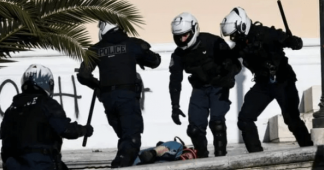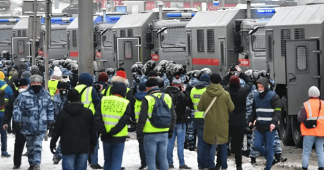23 Feb, 2021
Amnesty International, a human rights NGO, has withdrawn its designation of the recently jailed Russian activist and blogger Alexey Navalny as a “prisoner of conscience” due to past xenophobic statements he never retracted.
The group said it “is no longer able to consider” Navalny a prisoner of conscience because he “advocated violence and discrimination” and has never retracted any of such statements he made in the past. It maintained, however, that it still believes that his latest imprisonment was linked to his anti-government activism and demanded his “immediate release,” a letter published by Grayzone journalist Aaron Mate shows.
New: @AmnestyUK withdraws designation of Navalny as a "prisoner of conscience." In email, Amnesty says it's "no longer able to consider Aleksei Navalny a prisoner of conscience given the fact that he advocated violence and discrimination and he has not retracted such statements." pic.twitter.com/E9m0e6lzT8
— Aaron Maté (@aaronjmate) February 23, 2021
The decision was confirmed by Amnesty’s Russia and Eurasia media manager Aleksandr Artemyev.
“Yes, we will no longer use the phrase ‘prisoner of conscience’ when referring to him, since our legal and political department studied Navalny’s statements from the mid-2000s and concluded that they qualify as hate speech,” Artemyev told Mediazona.
However, he added that the organization will continue its calls for his immediate release since it considers Navalny’s arrest political.
The facts Amnesty International mentioned referred to Navalny’s early political life. In the 2000s, well before he rose to international fame, the activist and blogger was tightly linked to the Russian far-right scene and was a familiar face in the ‘Russian March’, an ultranationalist movement harboring xenophobic views toward immigrants as well as people living in the Russian southern Caucasus region.
At that time he also posted videos in which he compared Caucasus Muslims and migrants to cockroaches and even suggested using “pistols” against them in one such clip
here is another video navalny is not keen to share anymore, in which he compares muslims to cockroaches and flies and recommends shooting them with guns if swatters and shoes failhttps://t.co/xf0yDtA4s5
— katya (@kazbek) January 19, 2021
Later, as he ran for the Moscow mayor’s office, he significantly toned down his rhetoric but never actually renounced his previous statements.
In 2017, in an interview with the Guardian, he said he had “no regrets” about his past statements and called his comparison of migrants to cockroaches “artistic license.” Just last October, he also told Germany’s Der Spiegel magazine that he had “the same views” he had held when coming into politics.
"Decades-old tweets?" Incredible to see the revisionism around Navalny since he became a household name in the West.
This is from last October (2020), in @derspiegel. He was talking about why he was expelled from the liberal Yabloko Party (because of his far-right views). https://t.co/bjjtXAI5qF pic.twitter.com/12A6NlJGPR
— Bryan MacDonald (@27khv) January 21, 2021
Navalny’s latest imprisonment is, however, related to a 2014 case when he was found guilty of embezzling 30 million rubles ($400,000) from two companies, including the French cosmetics brand Yves Rocher. At that time, he got a suspended sentence, the terms of which he later breached, according to the latest court decision. Thus, his suspended sentence was converted into a real one.
Navalny’s arrest in January sparked protests among his supporters in many Russian cities and put a further strain on the already tense relations between Russia and the West. Most recently EU foreign ministers agreed to slap Russia with another batch of sanctions because of the opposition figure’s imprisonment.
The decision sparked a stark rebuke from Moscow that said Europe continued to “press the dysfunctional sanctions button” instead of at least trying to revive dialogue with Russia
Published at www.rt.com










